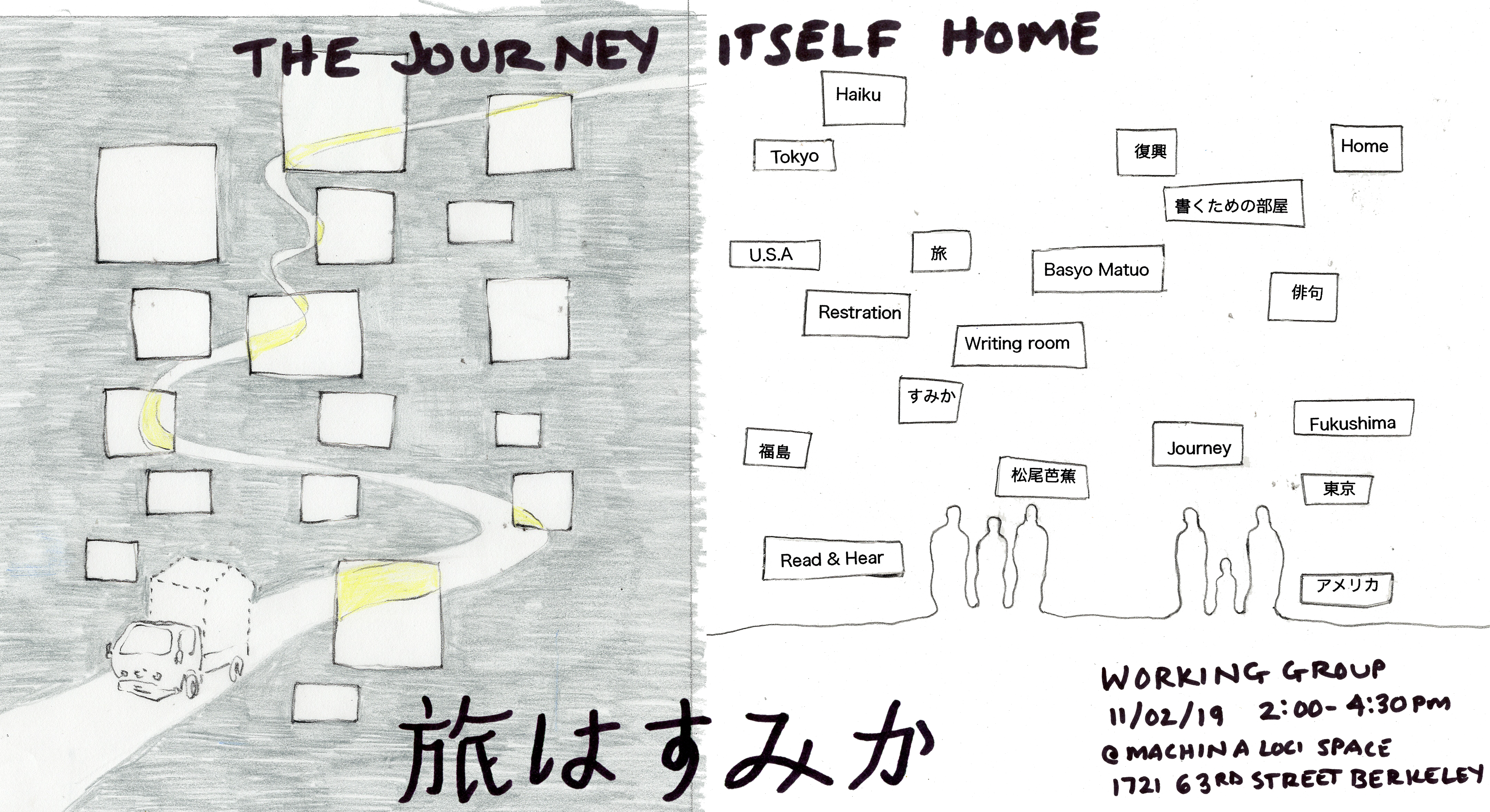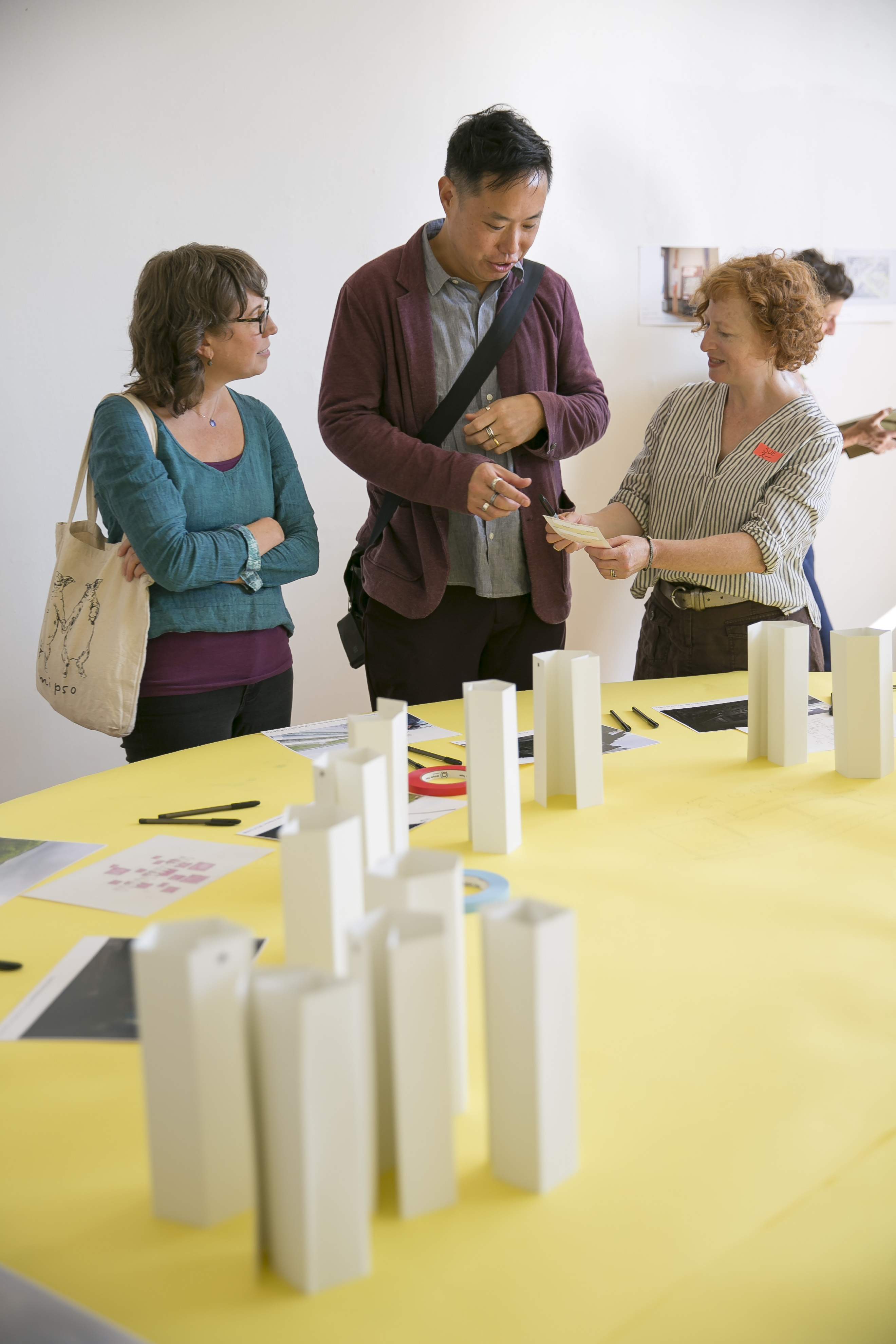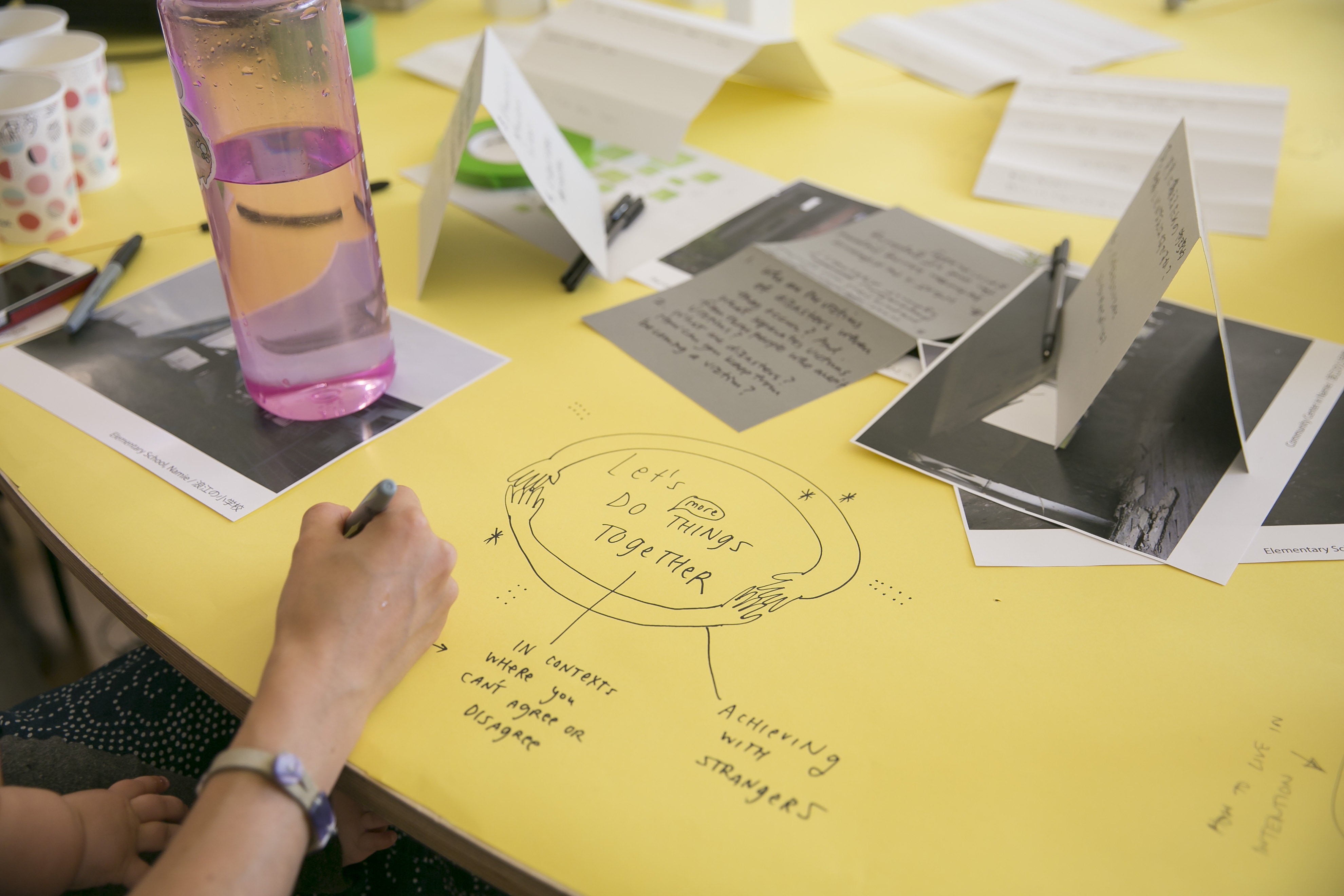ワークショップ
Working Group
Working Group

旅はすみかチーム初めての取り組みとして、日英二か国語の1Dayワークショップを企画。ベイエリアの活動家、作家、環境学者、記者、教育者や芸術家など、30名以上の多彩な顔ぶれがそろいました。この実験的な「声に出して考える」会の司会は、建築家・芸術家のCarol Manckeさんが担当されました。
For our first team collaboration, we designed a one day bilingual workshop. More than 30 participated, a rich mix of Bay Area activists, writers, environmentalists, journalists, educators & artists. This experimental ‘think- aloud’ was hosted by architect & artist Carol Mancke.
For our first team collaboration, we designed a one day bilingual workshop. More than 30 participated, a rich mix of Bay Area activists, writers, environmentalists, journalists, educators & artists. This experimental ‘think- aloud’ was hosted by architect & artist Carol Mancke.





好奇心に満ちた参加者が、様々な筆記エクササイズに協力作業で取り組む中で問題提起したのは、大災害に見舞われた後に被災者が直面する、回復、修復と、適応力に関する基本的な問題です。
多くの日本人の記憶から東日本大震災が薄れてきている中、社会的・環境的に破壊的な難題が未だ残されています。あの震災からもうすぐ10年を迎える今においても、福島県における復興事業はまだ完了していません。
コロナウイルス蔓延によって、世界中の人々が不安感に包まれ、身の安全を脅かされる思いを経験している現在と、東日本大震災当時を比較してみると、多くの共通点を見出せます。だからこそ、このプロジェクトに今取り組むことに意義を感じます。
Through various collaborative writing exercises, we asked this interesting group of minds to problematize the basic questions communities face immediately following a disaster: recovery, repair, resilience.
While the 3.11 Disaster has faded in the memories of many Japanese, the devastating human & environmental challenges persist. Even today, nearly 10 years after the triple disasters, recovery projects in Fukushima Prefecture are still only half-done.
Many parallels, including collective anxiety and questions of safety, can be drawn between the Fukushima disaster & the pandemic the world is experiencing now, making this work poignantly more relevant.
多くの日本人の記憶から東日本大震災が薄れてきている中、社会的・環境的に破壊的な難題が未だ残されています。あの震災からもうすぐ10年を迎える今においても、福島県における復興事業はまだ完了していません。
コロナウイルス蔓延によって、世界中の人々が不安感に包まれ、身の安全を脅かされる思いを経験している現在と、東日本大震災当時を比較してみると、多くの共通点を見出せます。だからこそ、このプロジェクトに今取り組むことに意義を感じます。
Through various collaborative writing exercises, we asked this interesting group of minds to problematize the basic questions communities face immediately following a disaster: recovery, repair, resilience.
While the 3.11 Disaster has faded in the memories of many Japanese, the devastating human & environmental challenges persist. Even today, nearly 10 years after the triple disasters, recovery projects in Fukushima Prefecture are still only half-done.
Many parallels, including collective anxiety and questions of safety, can be drawn between the Fukushima disaster & the pandemic the world is experiencing now, making this work poignantly more relevant.

安全とはどういう感じですか?
What does safety feel like?
誰が何を安全だと決めるのでしょう?
Who decides what is safe?
危険性は安全性とどのように関係しますか?
How is risk related to safety?
危険な状況には適応力が必要で
はないですか? Doesn’t risk require resilience?
災害発生後、どのように自然と
向き合いますか?
How do you respond to nature after a disaster?
人類の運命は、常に自然の手中にあるの
でしょうか?
Is our fate always bound by the fate of nature?
どうしたら犠牲者とならずに済むの
でしょうか?
How can you keep from becoming a victim?
Who decides what is safe?
危険性は安全性とどのように関係しますか?
How is risk related to safety?
危険な状況には適応力が必要で
はないですか? Doesn’t risk require resilience?
災害発生後、どのように自然と
向き合いますか?
How do you respond to nature after a disaster?
人類の運命は、常に自然の手中にあるの
でしょうか?
Is our fate always bound by the fate of nature?
どうしたら犠牲者とならずに済むの
でしょうか?
How can you keep from becoming a victim?
人類は自然の一部なのでしょうか?
Are we a part of nature?
周囲の自然環境に、どうしたら溶け込めるのでしょうか?
How do we incorporate ourselves into our surroundings?
気候変動否定論者の人々と、どうしたら対話を進め、協働していけるのでしょうか?
How do we dialog and act with people who are in denial of climate change?
被災体験はいかにして人間社会における様々な境界線を超越し、協同を促しますか?
How does disaster cut across differences & inspire collaboration?
どのようにして「話の聞き方」を
伝授しますか?
How do we teach methods of listening?
どうすれば、様々な視点をもつ人々が互いを理解し合えるようになるのでしょうか?
How can people with diverse views truly hear each other?
Are we a part of nature?
周囲の自然環境に、どうしたら溶け込めるのでしょうか?
How do we incorporate ourselves into our surroundings?
気候変動否定論者の人々と、どうしたら対話を進め、協働していけるのでしょうか?
How do we dialog and act with people who are in denial of climate change?
被災体験はいかにして人間社会における様々な境界線を超越し、協同を促しますか?
How does disaster cut across differences & inspire collaboration?
どのようにして「話の聞き方」を
伝授しますか?
How do we teach methods of listening?
どうすれば、様々な視点をもつ人々が互いを理解し合えるようになるのでしょうか?
How can people with diverse views truly hear each other?
復興とは何でしょう?
What is recovery?
被災前より、さらに良い状態にすることは可能でしょうか?
Can the end product be better?
心の傷を癒やすにはどうしたら良い
のでしょうか?
How do we heal ourselves?
他者を癒やす責任を私たちは受け持つことができますか?
Can we be responsible for healing others?
生きることこそが目標なのではないですか?
Isn’t the goal just life?
あなたの人生行路はどのようなものですか? What is the path of your life?
人生は思い通りになるものでしょうか?
Does life ever turn out as we intend?
What is recovery?
被災前より、さらに良い状態にすることは可能でしょうか?
Can the end product be better?
心の傷を癒やすにはどうしたら良い
のでしょうか?
How do we heal ourselves?
他者を癒やす責任を私たちは受け持つことができますか?
Can we be responsible for healing others?
生きることこそが目標なのではないですか?
Isn’t the goal just life?
あなたの人生行路はどのようなものですか? What is the path of your life?
人生は思い通りになるものでしょうか?
Does life ever turn out as we intend?
災害とは何でしょう?
What is a disaster?
災害が発生した時、誰が被災者なの
でしょうか?
Who is the victim when disaster happens?
災害が発生した時、何が失われ、何を得るのでしょう?
What is lost or gained when there is a disaster?
被災地における文化は、どう災害に対応するのでしょうか?
How do impacted cultures respond to disaster?
なぜ災害は、その体験者に連帯意識を
持たせることができるのでしょう?
How can disaster bring people experiencing it together?
災害に備えて、どのような物質的・精神的準備ができるでしょうか?
What physical & spiritual preparations can you make prior to a disaster?
What is a disaster?
災害が発生した時、誰が被災者なの
でしょうか?
Who is the victim when disaster happens?
災害が発生した時、何が失われ、何を得るのでしょう?
What is lost or gained when there is a disaster?
被災地における文化は、どう災害に対応するのでしょうか?
How do impacted cultures respond to disaster?
なぜ災害は、その体験者に連帯意識を
持たせることができるのでしょう?
How can disaster bring people experiencing it together?
災害に備えて、どのような物質的・精神的準備ができるでしょうか?
What physical & spiritual preparations can you make prior to a disaster?





